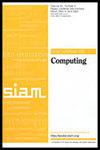Want to Gather? No Need to Chatter!
IF 1.6
3区 计算机科学
Q3 COMPUTER SCIENCE, THEORY & METHODS
引用次数: 0
Abstract
A team of mobile agents with different labels, starting from different nodes of an unknown anonymous network, must meet at the same node and declare that they all met. This task of gathering was traditionally considered assuming that agents at the same node can exchange information. We ask if this ability of talking is needed. The answer turns out to be no. We design two deterministic algorithms that accomplish gathering in a much weaker model. We only assume that each agent knows how many agents are at the node that it currently occupies. Our first algorithm assumes that agents know some upper bound N on the size of the network, and works in time polynomial in N and in the length of the smallest label. Our second algorithm does not assume any knowledge about the network, but its complexity is at least exponential in the size of the network and in the labels of agents. Its purpose is to show feasibility of gathering under this harsher scenario. As a by-product we solve, in the same weak model, the fundamental problem of leader election among agents. As an application we solve the gossiping problem in this model: if each agent has a message, all agents can learn all messages. This is perhaps our most surprising finding: agents without any transmitting devices can solve the most general information exchange problem if they can count the number of agents present at visited nodes.想要聚会吗?没有必要喋喋不休!
一组具有不同标签的移动代理,从未知匿名网络的不同节点出发,必须在同一节点相遇,并声明他们都相遇了。传统上认为,该收集任务假定同一节点上的代理可以交换信息。我们问是否需要这种说话的能力。答案是否定的。我们设计了两种确定性算法,在一个弱得多的模型中完成收集。我们只假设每个代理都知道它当前占用的节点上有多少代理。我们的第一个算法假设代理知道网络大小的上界N,并在N和最小标签长度的时间多项式中工作。我们的第二种算法不假设任何关于网络的知识,但它的复杂性在网络的大小和代理的标签上至少是指数级的。其目的是展示在这种严酷的情况下聚会的可行性。作为一个副产品,我们在同样的弱模型中解决了主体间领导选举的基本问题。作为一个应用,我们解决了该模型中的八卦问题:如果每个代理都有一条消息,那么所有代理都可以学习所有消息。这可能是我们最令人惊讶的发现:没有任何传输设备的代理可以解决最一般的信息交换问题,如果它们可以计算访问节点上存在的代理的数量。
本文章由计算机程序翻译,如有差异,请以英文原文为准。
求助全文
约1分钟内获得全文
求助全文
来源期刊

SIAM Journal on Computing
工程技术-计算机:理论方法
CiteScore
4.60
自引率
0.00%
发文量
68
审稿时长
6-12 weeks
期刊介绍:
The SIAM Journal on Computing aims to provide coverage of the most significant work going on in the mathematical and formal aspects of computer science and nonnumerical computing. Submissions must be clearly written and make a significant technical contribution. Topics include but are not limited to analysis and design of algorithms, algorithmic game theory, data structures, computational complexity, computational algebra, computational aspects of combinatorics and graph theory, computational biology, computational geometry, computational robotics, the mathematical aspects of programming languages, artificial intelligence, computational learning, databases, information retrieval, cryptography, networks, distributed computing, parallel algorithms, and computer architecture.
 求助内容:
求助内容: 应助结果提醒方式:
应助结果提醒方式:


